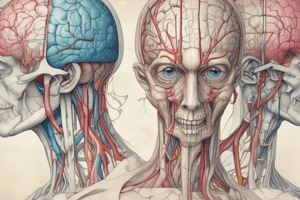Podcast
Questions and Answers
What is the significance of the flexion withdrawal reflex?
What is the significance of the flexion withdrawal reflex?
It is a protective and prepotent reflex that inhibits other reflexes occurring at the same time.
What is the result of the crossed extensor reflex when a noxious stimulus is applied to a limb?
What is the result of the crossed extensor reflex when a noxious stimulus is applied to a limb?
It results in the withdrawal of the same limb and the extension of the opposite limb to support the body.
What type of fibers are involved in the flexion withdrawal reflex for fast pain? What about for slow pain?
What type of fibers are involved in the flexion withdrawal reflex for fast pain? What about for slow pain?
A δ fibers are involved for fast pain, while C fibers are involved for slow pain.
What condition can result in an absent reflex due to a lesion in the afferent pathway?
What condition can result in an absent reflex due to a lesion in the afferent pathway?
Which condition can lead to an absent reflex due to a lesion in the efferent pathway?
Which condition can lead to an absent reflex due to a lesion in the efferent pathway?
Which condition can result in an absent reflex due to a lesion in the afferent pathway?
Which condition can result in an absent reflex due to a lesion in the afferent pathway?
What type of fibers are involved in the flexion withdrawal reflex for fast pain?
What type of fibers are involved in the flexion withdrawal reflex for fast pain?
Which type of reflex inhibits other reflexes occurring at the same time?
Which type of reflex inhibits other reflexes occurring at the same time?
What is the result of the crossed extensor reflex when a noxious stimulus is applied to a limb?
What is the result of the crossed extensor reflex when a noxious stimulus is applied to a limb?
Which condition can lead to an absent reflex due to a lesion in the efferent pathway?
Which condition can lead to an absent reflex due to a lesion in the efferent pathway?
What is the significance of the flexion withdrawal reflex?
What is the significance of the flexion withdrawal reflex?
Which type of fibers are involved in the flexion withdrawal reflex for fast pain?
Which type of fibers are involved in the flexion withdrawal reflex for fast pain?
What is the result of the crossed extensor reflex when a noxious stimulus is applied to a limb?
What is the result of the crossed extensor reflex when a noxious stimulus is applied to a limb?
Which condition can lead to an absent reflex due to a lesion in the afferent pathway?
Which condition can lead to an absent reflex due to a lesion in the afferent pathway?
Which condition can result in an absent reflex due to a lesion in the efferent pathway?
Which condition can result in an absent reflex due to a lesion in the efferent pathway?
Study Notes
Superficial Somatic Spinal Reflexes
- Definition: Somatic polysynaptic spinal reflex that requires the integrity of the pyramidal system.
Planter Reflex
- Stimulus: Scratching of the lateral (outer) edge of the sole of the foot with a blunt object (e.g., a key) starting from the heel towards the little toe and then along the bases of the toes medially.
- Normal response: Planter flexion of all toes.
- Center: AHCs of S1, 2 segments.
Abnormal Response: Babinski's Sign
- Definition: Modified response characterized by dorsiflexion of the big toe and/or fanning of other toes.
- Physiological Babinski's sign:
- Occurs in infants in the first year of life due to incomplete myelination of the pyramidal tract.
- Occurs in adults during deep sleep, deep anesthesia, or coma due to depressed activity of the motor cortex.
- Pathological Babinski's sign:
- Occurs in Upper Motor Neuron Lesion (U.M.N.L).
- Characteristics:
- Dorsiflexion of the big toe (pyramidal lesion).
- Fanning of other 4 toes (extrapyramidal lesion).
Studying That Suits You
Use AI to generate personalized quizzes and flashcards to suit your learning preferences.
Description
Test your knowledge about superficial somatic spinal reflexes with this quiz. Learn to identify different spinal reflexes and recognize their centers. Explore the examination of these reflexes and their definitions.




